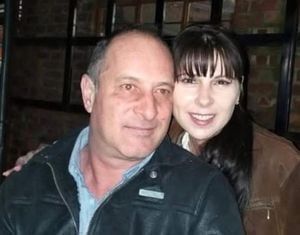A man who was pardoned by President Donald Trump for his involvement with the 2021 U.S. Capitol riot was fatally shot on Sunday, January 26, 2025, during a traffic stop near Jasper County, Indiana. Matthew Huttle, 42, became embroiled in a deadly encounter with officers from the Jasper County Sheriff’s Department around 4:15 p.m. The incident occurred on State Road 14 near the Pulaski County line.
According to the Indiana State Police, the confrontation began when officers attempted to arrest Huttle, who was reportedly found to be in possession of a firearm. The circumstances surrounding the traffic stop—including why Huttle was pulled over—remain unclear. Witnesses reported seeing Huttle resist the arrest, leading to the officer firing his weapon and fatally wounding him.
Jasper County Sheriff Patrick Williamson expressed condolences to Huttle’s family. “Our condolences go out to the family of the deceased as any loss of life is traumatic to those who were close to Mr. Huttle,” Williamson stated, adding, “For full transparency, I requested the Indiana State Police to investigate this officer-involved shooting.” The deputy involved has been placed on paid administrative leave as is customary during such investigations.
Huttle’s death marks a tragic continuation of his tumultuous recent history. After participating in the January 6 Capitol riot, Huttle was pardoned by Trump just days before his death. He traveled to Washington, D.C., with his uncle to attend the pro-Trump rally, where he was later recorded inside the Capitol for approximately 16 minutes. His defense attorney characterized him as someone who was not politically motivated, but rather someone who mistakenly thought he was documenting history.
Andrew Hemmer, Huttle's attorney, previously noted, “He is not a true believer in any political cause. He instead went to the rally because he thought it would be a historic moment and he had nothing else to do with his time.” Huttle had pled guilty to entering a restricted building and was sentenced to six months, followed by supervised release. His attorney pointed out his struggle with alcohol addiction, which had plagued Huttle for years.
Huttle faced numerous personal tragedies, including the deaths of significant family members. His mother passed away in April 2023, and the mother of his son died the previous year from a fentanyl overdose. Adding to these woes, he was also involved in multiple violent incidents over the past decade, including being shot and then attacked, leading to severe physical and mental health challenges.
On the day of the shooting, the dynamics surrounding the traffic stop have raised questions. According to police reports, the officer attempted to detain Huttle, who was seemingly agitated and uncooperative. The details of what transpired immediately before the officer discharged their weapon have yet to emerge, but Huttle's actions have put the spotlight on police conduct during traffic stops.
Law enforcement continues to investigate the shooting, with the results expected to be submitted to the county prosecutor for review once the inquiry is complete. The framework for accountability, following officer-involved shootings, highlights the importance of transparency and due process, both for the victim's family and the associated law enforcement community.
The shooting of Matthew Huttle is not merely another statistic; it reflects the continuing issues faced at the intersection of policing, mental health, and the consequences of participation in extremist movements. While Huttle's actions on January 6 brought him national attention, his fate is emblematic of the many lives disrupted by political discord and personal struggle.
Huttle's uncle, Dale Huttle, had also engaged actively during the January 6 events and has commented on the riots as having fulfilled a patriotic duty. He was sentenced to more severe penalties for his actions than Matthew and was only released following the broad pardon issued by Trump.
“I put myself on the line to defend the country. And I have, I have no regrets,” Dale Huttle was reported saying after the events. His statements reflect the fervent views held by many involved on January 6, providing clarity on the motivations and miscommunications prevalent within such groups.
The examination of Matthew Huttle’s life, actions, and untimely death brings forth broader discussions about justice, accountability, and societal healing. The community now reflects on the loss of life and the circumstances leading to such violence during what should have been routine interactions with law enforcement.
While law enforcement agencies remain committed to reviewing this incident thoroughly, the balance between officer safety and community relations continues to be of grave concern. The tragic end to Huttle's life serves as yet another somber reminder of how divisions within society manifest during encounters with authority.



